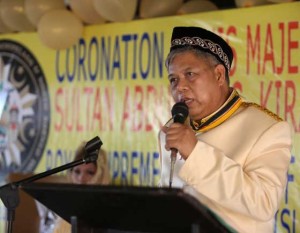THE newly-crowned Sultan of the Royal Supreme Sultanate of Sulu Archipelago & North Borneo Islands (RSSSNBI) has called the move of the Malaysian state of Sabah closing its cross border trade in the Southern Philippines as “questionable and without legal basis.”
Sultan Abdullah Kiram said he strongly opposed the unilateral action by the Malaysian government, and will set a meeting with its ambassador to the Philippines to clear the issue.
“The act of Malaysia is widely questionable and without legal basis,” he pointed out.
Sultan Kiram was enthroned in a ceremony held at the Bulwagang Plaridel of the National Press Club (NPC) in Manila on Saturday with the launching of the Royal Supreme Sultanate of Sulu Archipelago & North Borneo Islands (RSSSNBI) as a unique cultural and traditional kingdom, witnessed by religious leaders and the royal council of ministers of the Sultanate.
“I will be sending a formal request to the Ambassador as a private citizen and taxpayer and, of course, in my capacity as Sultan of the Sulu Archipelago & North Borneo Islands for a private meeting on how to resolve this problem so that the Philippine and Malaysian governments can diplomatically solve the situation that has greatly affected our people in Southern Philippines,” Kiram said.
Early last month, Sabah shut down its cross-border trade with Tawi-Tawi province following the spate of daring kidnappings by the Abu Sayyaf Group (ASG) within its territory.
Following the closure, residents there can no longer travel to nearby Sabah since the Malaysian Coast Guard, backed up by its Navy, are keeping close watch on the border where boats from Tawi-Tawi are prevented from coming in. It also affected economic activities in the province, where traders buy goods from Sabah and sell them back home.
Sultan Kiram lamented that Sabah (formerly North Borneo) was unilaterally annexed or absorbed by Malaysia when the Federation of Malaysia was formed in 1963 without the express consent of the Sultan of Sulu that has proprietary rights over the timber and oil resources there.
He said two distinct juridical governments encompass the Sultanate – the Republic of the Philippines and the Federal Republic of Malaysia – but tradition and culture bind the people who are largely Christian and Muslim minority.
Historically, North Borneo and the island of Palawan were gifts to the Sultan of Sulu by the Sultan of Brunei in 1658 in gratitude for the assistance rendered by the former to avert civil war in Borneo. Since then, Sabah became a property of the Sultan of Sulu and the Sultanate of Sulu.
However, Malaysia as the tenant is not paying the right amount to the Lessor Landlord that is the Sultan of Sulu. The basis is a Standard Chartered Bank check received from the Embassy of Malaysia in the Philippines on April 16, 2003 as payment of cession money to the heirs of the Sultan of Sulu in the amount of P73,940.77, corresponding to the annual rental by Malaysia over Sabah.
The Sultanate, in 1878 Sultan Jamalul Ahlam Kiram (The Sultan of Sulu and the Sultan of Sabah) as legitimate owner, leased Sabah to the British company of Gustavus Baron de Overbeck and Alfred Dent for their and their heirs’ use, however, the lease prohibits the transfer of Sabah to any nation, company, or individual without the consent of His Majesty’s Government, or the Government of the Sultan of Sulu.
Hence, the transfer of Sabah by Great Britain to Malaysia in 1963 constituted a breach of the provisions of 1878 lease as the Government of the Sultan of Sulu did not consent to the transfer to Malaysia.
Legally, Sabah must and should be returned to the Sultan of Sulu and the Sultanate of Sulu as the Lessor, Kiram further said.
JULMUNIR I. JANNARAL


